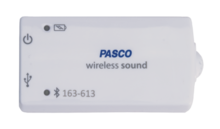Sound of Vibrating Strings
We will explore qualitatively how string tension, length, and linear density affect the sound of the vibrating string. Then we will take measurements for the following situations:
1. The frequencies of two strings of the same length and tension but different linear densities are compared. 2. The length of the vibrating string is varied and the frequency of the sound is measured with the Wireless Sound Sensor and the relationship between string length and frequency is determined. 3. The tension in the vibrating string is varied and the frequency is measured and the relationship between the string tension and the frequency is determined. In addition, for a given string tension, the length of a string will be adjusted until each tuning fork in the set causes the string to resonate. The vibrating tuning fork is held against the Sonometer sounding board and when the resonant frequency of the string matches the frequency of the tuning fork, the paper riders on the string will vibrate.
Grade Level: College
Subject: Physics
Student Files
| Sound of Vibrating Strings | 568.11 KB | |
| Sound of Vibrating Strings | 233.51 KB | |
| Sound of Vibrating Strings | 365.18 KB |
Teacher Files
Sign In to your PASCO account to access teacher files and sample data.
Featured Equipment
Sonometer
With this two-string guitar, students can hear the resonance modes of the strings.
Wireless Sound Sensor
The Wireless Sound Sensor measures sound wave forms and sound level in one compact and portable sensor.
Sound of Vibrating Strings Experiment
Examine how tension and string length affect the sound of the vibrating string.
Support
Many lab activities can be conducted with our Wireless, PASPORT, or even ScienceWorkshop sensors and equipment. For assistance with substituting compatible instruments, contact PASCO Technical Support. We're here to help.
Copyright © 2022 PASCO
Complete Experiments: Waves & Optics
More Experiments
College
High School



